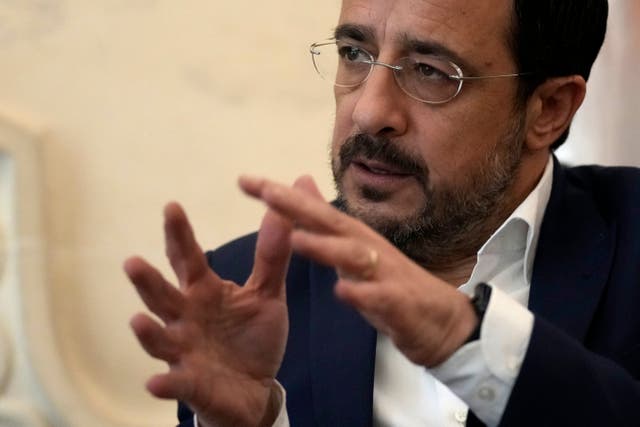Cyprus’ president says country is ready to ship aid to Gaza
President Nikos Christodoulides said planning on the corridor is essentially completed and will allow aid to flow once fighting is paused.

Cyprus is ready to “immediately” begin shipping large quantities of humanitarian aid to Gaza in vessels that can navigate shallow water once conditions on the ground allow for it, the president of the east Mediterranean island nation said on Monday.
President Nikos Christodoulides said his country’s proposal for a maritime corridor from the port of Larnaca to Gaza is the “only one currently being discussed on an international level” as a feasible way to significantly supplement the trickle of aid getting into the enclave through Egypt’s Rafah border checkpoint.
Planning for the corridor, which is about 230 miles (370 kilometres), is essentially completed, and aid can begin to flow once a pause in fighting is declared, Mr Christodoulides said.

He said: “Everyone supports this initiative, the European Union, the United States. When we say that we’re a bridge to the region, we’re showing this in practice. It’s very important for our country.”
More significant is that Israeli foreign ministry spokesperson Lior Haiat said that his country was “definitely in favour of the project”.
Mr Haiat said: “We are exploring it with all the relevant ministries and agencies in Israel.”
Israel put Gaza under siege and declared war on the Hamas militants who rule the Palestinian enclave after the group carried out a surprise attack in southern Israel on October 7, killing hundreds of people and taking 240 hostages.
Aid organisations say that civilians do not have enough food or clean water, and hospitals in Gaza report being out of even basic medical supplies.
The Israeli government has said it was reluctant to let aid into Gaza because Hamas might divert the shipments and thereby extend the group’s survival.

In the immediate term, shallow-draft vessels will be used to ferry the aid and Cyprus is in contact with Gulf countries that can dispatch such ships, Mr Christodoulides said.
The president said: “What do we want? We want everything to be in place so when the situation on the ground allows for it, we can start.”
In the medium term, planning foresees the construction of a floating dock off Gaza where all types of ships can offload assistance.

According to Mr Christodoulides, a side benefit to using the port of Larnaca to load cargo is its ample facilities to store the aid and its proximity to the island’s main airport as well as a US-funded facility built to train personnel from Cyprus and neighbouring countries on port and maritime security.
Medicine, food, clothing and other essentials collected and stored at the port will flow to Gaza continuously, but it would be a one-way aid corridor, meaning that no Palestinians would be permitted to use the ships to leave the enclave, he said.
Aid reaching Gaza would be distributed by the United Nations agency for Palestinian refugees using its established network, Mr Christodoulides added.





